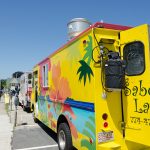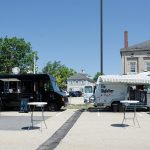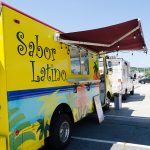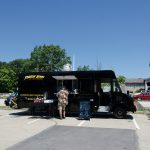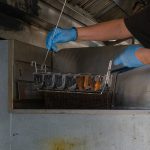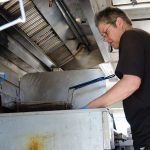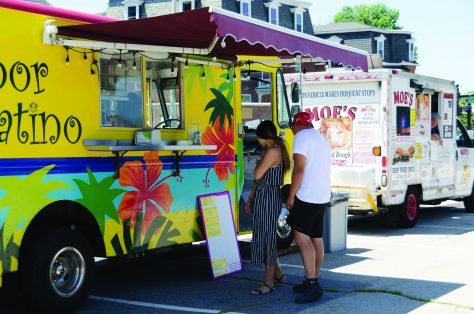
Local food trucks are serving up variety, great food and a fun way to dine in Central Massachusetts. And now, they’re more popular than ever before.
Monday-Saturday from 11 a.m.–2 p.m., a treasure trove of Worcester’s food trucks can be found waiting at Food Truck Row, located in a public parking lot on Highland Street behind the Worcester Auditorium. Beyond offering up great food, these food trucks offer up great stories and interesting histories as they make their mark on Worcester’s food scene.
The Dogfather is a well-known staple on the Worcester food truck scene. The business began with a series of unexpected events, according to owner Mark Gallant.
“It all started with a Crock-Pot of chili,” Gallant said. Gallant invented his own chili recipe and entered the Pulse Magazine Chili Cook-Off, where he won first place three years in a row. After losing his job, Gallant was at home when he came up with the idea of using hot dogs as a “delivery method” for his award-winning chili. From there, The Dogfather was born and “the hot dogs took on a life of their own.”
The Dogfather uses Kayem natural hot dogs and has 6 million combinations of hot dog toppings to choose from, according to a professor who stopped by the food truck one day. Gallant enjoys seeing the reactions of the customers who visit his truck. “We will put anything on a hot dog, and you cannot get that any place else,” he said.
After nine years in business with The Dogfather, Gallant has seen firsthand how the food truck industry in Worcester has evolved. According to Gallant, the city of Worcester has become much friendlier to food trucks throughout the years. “When I started in the business, four food trucks were permitted in the city; now, there are 50.”
Not only are there more food trucks in the city, but together, they have formed a supportive community of their own. Gallant said that the area food trucks have come together to create Woo Trucks, which is a coalition of food trucks in the city. Woo Trucks oversees the new Food Truck Row on Highland Street, as well as hosts many food truck festivals in the area. Whether it is giving referrals for jobs or even letting another food truck borrow a generator when theirs is broken, Gallant is proud of the camaraderie that has developed among the food truck owners in Worcester, and he wants food enthusiasts to see that sense of community for themselves on Food Truck Row.
“Support the local food trucks in Worcester!” he said.
Scott Tefft spent 30 years in the catering business before coming onto the Worcester food truck scene in 2014 with his company, Big T’s BBQ. Tefft was attending a Worcester City Council meeting when the members announced that they were relaxing the laws in regards to food trucks to entice more businesses into the city.
“The next thing you know, I am selling barbecue in the city of Worcester,” Tefft said. After previously having two restaurants and working behind the scenes in the kitchen for years, Tefft wanted a way to interact with his customers directly and cook without all the capital and risk of a restaurant. “With a food truck, I am able to build a business.”
Tefft likes traveling around and does not have a set schedule. Instead of sitting roadside, Big T’s BBQ can usually be found at local festivals, concerts and breweries. He regularly posts his location on social media. BBQ Pulled Pork, Texas Brisket and Carolina Chicken are Tefft’s tasty regular dishes, but he always enjoys experimenting with different meats and marinades. The ability to have variety and try experimental dishes is a reason why Tefft believes food trucks have become such a huge trend in Worcester.
“It gives people a different opportunity to try something new.” Today, Big T’s BBQ has two trucks, with hopes of one day acquiring a storefront to sell barbecue sandwiches every day.
While hot dogs and barbecue are more traditional food truck offerings, Worcester also has its share of unconventional cuisine. Teddy’s Lunchbox is a “whimsical” food truck that features out-of-the-box recipes, according to owner Melissa Vaillancourt. Owning a restaurant was a dream that Vaillancourt shared with her father and a goal she wanted to pursue even after he passed away. The idea for a food truck came while she and her husband were at a show and waiting in line at a food truck. After waiting for 30 minutes and receiving raw food, Vaillancourt realized she could do better then that.
“We kind of got thrown into it,” she joked about the start of her food truck venture.
Using her 15 years of cooking experience, Vaillancourt started Teddy’s Lunchbox along with her mother, Carmen Ryfa, and her brother, Anthony Ryfa. According to Vaillancourt, her brother comes up with all the “off-the-wall recipes,” such as the Bacon Mac and Cheese Quesadilla. Instead of having a restaurant with a set menu, a food truck allows the family the flexibility to experiment with recipes and create new flavors.
“People like the idea of variety and the idea of food coming to them,” Vaillancourt said of the food truck trend. While restaurants are more “cutthroat,” according to Vaillancourt, the food truck industry in Worcester fully supports one another and lends each other a hand in times of need. Vaillancourt recalled a time when her generator broke, and The Dogfather lent them one.
“One big food truck family. Really nice community to work with,” Vaillancourt said.
John Wadkins and his business partner, Jay Fiset, were classically trained chefs working in fine dining restaurants in Boston when a friend needed help at a food truck festival. It was during that event that Wadkins and Fiset were inspired to get a food truck of their own. Instantly, the duo had 10 different ideas for food trucks, ranging from classic burgers to gourmet fresh pasta. However, they liked the idea of creating cheesy fries and having a poutine truck.
“Whatever we can put on fries, we can put in between two pieces of bread, as well,” Wadkins said. This led to the creation of Melt.
Starting the actual food truck business took some time, as Wadkins and Fiset had to adjust to cooking on a truck. Restaurants have big kitchens, easy access to ingredients and time for the chefs to create dishes. In a food truck, Wadkins and his business partner had to work in a much smaller space and work more quickly. Designing and reconfiguring the Melt truck took about a year and a half. While the truck cost $37,000, Wadkins explained that food trucks are still much more affordable than restaurants and do not have as many risks involved.
“Doing the numbers, having a restaurant is not as lucrative as people think it is,” he said.
The Melt food truck travels from Worcester to Boston and every place in between. Wadkins likes being at a different spot every day because he enjoys seeing new places and different people every week. Wadkins believes that the fine dining fad is giving way to food trucks. For Wadkins, food trucks have it all: quick service, cheap prices, variety and constant travel, which keeps it “fresh and fun” for both the customers and the food truck owners themselves.
“It’s fun!” he said.
What started as a joke became a successful business for Veronica Crespo. After 30 years in the food business, Crespo was thinking about unique food truck ideas when she thought about what her own favorite food was – the Cuban food that her grandmother made for her. It took three years after buying the truck to be in business, but Sabor Latino officially opened in March of 2017. Crespo jokes that she entered the food truck industry with “rose-colored glasses on.”
“Food trucks were becoming a trend, and I did not want to deal with brick and mortar,” Crespo explained of her decision to get a truck. She also enjoys the freedom of traveling around. “I am a slave to my truck, but it affords me the opportunity to meet different people.”
As far as she knows, Sabor Latino is the only food truck specializing in Cuban cuisine that exists in the area. In the past, Worcester was behind the times, while other cities welcomed food trucks. Today, Crespo credits the city government for “embracing” food trucks. She is also excited that Food Truck Row was established for this growing industry.
“I really hope to see people come out and embrace it,” she said. Sabor Latino can be regularly found at Food Truck Row, Tuesdays through Fridays. For Crespo, Sabor Latino is not just about celebrating Cuban cuisine, but it is also about paying homage to the “beautiful memories” she has of her grandmother.
“These are her recipes,” she said.
In addition to Food Truck Row, food trucks can also be found at local breweries. At Cold Harbor Brewing in Westborough, food trucks were the perfect addition, according to head brewer and co-founder, Brandon Heisler, and his business partner, Will Oliveria. Heisler explains that after receiving their pouring license from the city, he and Oliveria were concerned about people drinking without eating food for safety reasons. The addition of the food trucks allowed customers to eat, but more importantly, it gave the brewery more of a family-friendly atmosphere. Instead of just being a place where people drink, Heisler and Oliveria wanted Cold Harbor Brewing to be “a place where people can go to feel welcome.”
What started as a test run of having food trucks on the weekends has turned into a crowded, regular event at the brewery. Not only has adding food trucks made the brewery feel more “community-oriented,” but it also allows Cold Harbor Brewing and the food trucks to support one another. At Cold Harbor Brewing, Heisler said, “true relationships” are formed between the brewery staff and the food truck owners. The music, relaxing atmosphere and fun food truck cuisine allows people of all ages to enjoy themselves at Cold Harbor Brewing
Scott Cullen, co-owner and head brewer of River Styx Brewing in Fitchburg, took his time researching the brewing industry and traveled all over the country. While traveling, he began noticing the relationship between breweries and food trucks. Cullen said he likes that food trucks are an unconventional way of getting take-out.
“It goes well with the brewery vibe,” he said.
River Styx Brewing has food trucks almost every day, with some of the trucks even using River Styx beer in their sauce recipes. Cullen is constantly trying out new trucks and gathering suggestions to see what works best for the brewery. Overall, Cullen is happy with the decision to invite food trucks to the brewery. “The response has been good – a great idea,” he said.
Whether driving around the city, partnering with local breweries or even spending an afternoon at Food Truck Row, these food trucks are around to make sure that the people of Worcester get their favorite food fixes.
Story by Sloane Perron • Photography by Madison Busick

